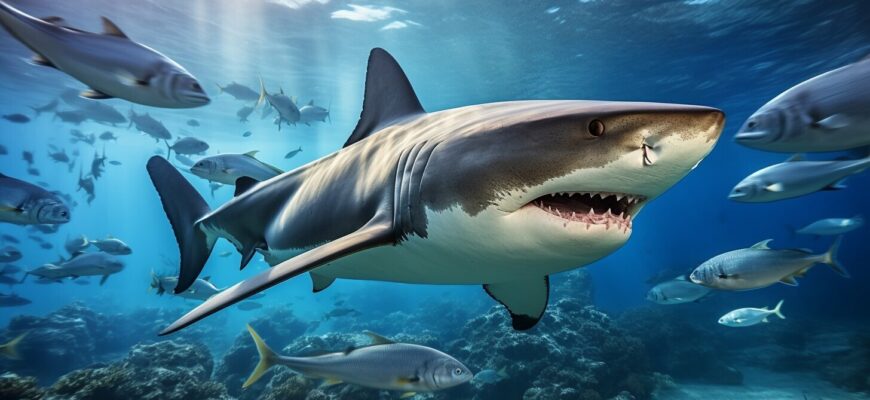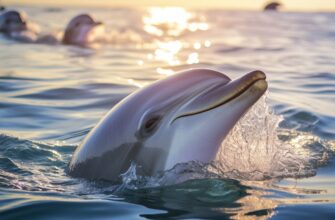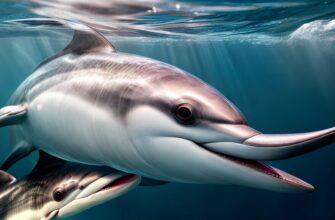Dolphins are among the most fascinating creatures on earth. They are friendly, intelligent, and social animals that capture our attention with their playful behavior and graceful movements. But have you ever wondered, how long do dolphins live? In this article, we will explore the lifespan of these magnificent creatures, the factors that affect their longevity, and how they fare in different environments.
Dolphins belong to the family Delphinidae, which includes around 90 species of marine dolphins. Each species has its own unique characteristics, including lifespan. On average, dolphins can live up to 40 years, but some species can live much longer than that. For example, the bottlenose dolphin, which is one of the most well-known species, can live up to 50 years or more in the wild.
- Key Takeaways:
- Factors Affecting Dolphin Lifespan
- Environmental Conditions
- Predation and Diseases
- Human Impact
- Lifespan of Dolphins in the Wild
- Lifespan of Dolphins in Captivity
- Is it ethical to keep dolphins in captivity?
- Maximum Lifespan of Dolphins
- Lifespan of Dolphins: A Summary
- What We’ve Learned About Dolphin Lifespan
- FAQ:
- Q: How long do dolphins live?
- Q: What factors affect dolphin lifespan?
- Q: What is the lifespan of dolphins in the wild?
- Q: How long do dolphins live in captivity?
- Q: What is the maximum recorded lifespan of dolphins?
Key Takeaways:
- Dolphins are social, intelligent animals that capture our attention with their playful behavior and graceful movements.
- There are around 90 species of marine dolphins, each with its own unique characteristics, including lifespan.
- The average lifespan of dolphins is around 40 years, but some species can live up to 50 years or more in the wild.
Factors Affecting Dolphin Lifespan
Dolphins, like many other species, have a lifespan that can be influenced by various factors. These factors can be broadly categorized into environmental conditions, predation and diseases, and human impact.
Environmental Conditions
The environment in which a dolphin lives can have a significant impact on its lifespan. Factors such as water temperature, food availability, and water pollution can affect dolphin health and longevity. For example, high levels of pollution can lead to respiratory issues and weakened immune systems, while colder waters can make it harder for dolphins to maintain their energy levels.
Predation and Diseases
Like all animals, dolphins in the wild also face threats from predators and diseases. Predators such as sharks can attack and kill dolphins, while diseases like Morbillivirus can spread rapidly through populations and cause mortality. These threats can impact the lifespan of dolphins in the wild, especially if they occur at an early age.
Human Impact
Human impact is one of the biggest threats to the survival of dolphins. Factors such as overfishing, bycatch, and habitat loss due to human activities can all impact dolphin populations and their lifespan. Additionally, dolphins in captivity face their own set of risks, including stress-related illnesses and a lack of stimulation.
Overall, while there are many factors that can impact the lifespan of dolphins, it is important to recognize the importance of their survival and to work towards protecting and preserving these magnificent creatures for future generations to appreciate.
Lifespan of Dolphins in the Wild
Dolphins are one of the most intelligent and beloved creatures on the planet. With their playful nature and friendly demeanor, they have captured the hearts of millions of people around the world. But how long can these fascinating creatures survive in their natural habitat?
The average lifespan of a dolphin in the wild varies by species. For example, bottlenose dolphins, the most commonly recognized species, have been known to live up to 50 years, while the spinner dolphin’s lifespan is around 20 years. Some species, such as the killer whale, can live up to 90 years in the wild.
However, the lifespan of dolphins in the wild can be affected by numerous factors. One of the biggest threats to their longevity is human impact, with pollution, climate change, and overfishing all taking a significant toll on dolphin populations. They also face danger from natural predators, such as sharks and killer whales, as well as diseases and infections that can spread rapidly throughout their communities.
Despite these challenges, dolphins have developed remarkable abilities to adapt to their environments. Some species have been known to migrate long distances in search of food or mating opportunities, while others have learned to cooperate with humans in order to survive.
Overall, the lifespan of dolphins in the wild is a complex and often unpredictable phenomenon. While some individuals may enjoy a long and healthy life, others may fall victim to the many challenges they face in their natural habitat.
Lifespan of Dolphins in Captivity
Dolphins can live for many years, but their lifespans in captivity can be significantly shorter than those in the wild. On average, captive dolphins live for around 20 to 25 years, although some have been known to live into their 40s or even 50s. This is much shorter than the average lifespan of wild dolphins, which can range from 40 to 60 years depending on the species.
There are several reasons why dolphins in captivity may have shorter lifespans than their wild counterparts. One major factor is stress. Captive dolphins are often kept in small tanks or pools, which can be highly stressful and lead to health problems. They may also be separated from their family groups, which can cause social isolation and further stress.
Another factor is diet. Captive dolphins are typically fed a diet of frozen fish, which may not provide the same nutrients as the varied diet of wild dolphins. This can lead to health problems such as obesity and digestive issues.
There is also evidence that captivity can lead to a higher risk of disease and illness. In some cases, captive dolphins have been exposed to antibiotic-resistant bacteria, which can be difficult to treat and may ultimately lead to death.
Despite these challenges, some marine parks and aquariums have taken steps to improve the living conditions of captive dolphins. For example, some facilities have created larger tanks and provided enrichment activities to help keep the dolphins engaged and mentally stimulated.
Is it ethical to keep dolphins in captivity?
The ethics of keeping dolphins in captivity is a contentious issue. Some argue that it is cruel to keep these intelligent and social animals in small tanks, away from their natural habitat and social groups. Others argue that captivity can provide valuable opportunities for research, education, and conservation efforts.
Regardless of your opinion on the matter, it is important to understand and acknowledge the challenges that captive dolphins face and work to improve their living conditions whenever possible. By doing so, we can help ensure that these amazing creatures are given the best possible chance at a long and healthy life.
Maximum Lifespan of Dolphins
While the average lifespan of dolphins varies by species and habitat, some have been recorded to live much longer than expected. The maximum recorded lifespan of a bottlenose dolphin is 63 years for a female and 49 years for a male.
However, other dolphin species have been known to live even longer. A Risso’s dolphin, for instance, was estimated to be around 80 years old in the wild.
Research suggests that factors such as genetics, diet, and social bonds may contribute to a longer lifespan in dolphins. Female dolphins, for example, tend to live longer than males, potentially due to their lower metabolic rates and negligible exposure to testosterone.
It is important to note that these long-lived individuals are the exception rather than the norm. The majority of dolphins, particularly those in captivity, do not live to reach their maximum lifespan due to various factors such as stress and inadequate living conditions.
“The maximum recorded lifespan of a bottlenose dolphin is 63 years for a female and 49 years for a male.”
Overall, continued research and conservation efforts are necessary to better understand and protect these incredible creatures.
Lifespan of Dolphins: A Summary
Throughout this article, we have explored the fascinating world of dolphin lifespan. These remarkable creatures can live for several decades, with their lifespan varying depending on a range of factors.
Factors that can affect dolphin lifespan include environmental conditions, predation, diseases, and human impact. While dolphins in captivity may live shorter lives than those in the wild, exceptions do exist. It is important to consider the ethical implications of keeping dolphins in captivity and how it may impact their longevity.
What We’ve Learned About Dolphin Lifespan
We’ve discovered that the average lifespan of dolphins varies depending on the species, with some living up to 60 years or more. While they face many challenges in the wild, their adaptability and social nature allow them to thrive in a range of environments.
Finally, we’ve explored the maximum recorded lifespan of dolphins, with some individuals living beyond 60 years. While there is still much to learn about these incredible creatures, we can certainly conclude that they are worthy of our admiration and protection.
Overall, understanding the lifespan of dolphins is essential in ensuring their continued survival and well-being. As we continue to study these intelligent and charismatic animals, we are reminded of the unique and awe-inspiring world that surrounds us.
FAQ:
Q: How long do dolphins live?
A: The lifespan of dolphins can vary depending on various factors, including species and environmental conditions. On average, dolphins can live for several decades.
Q: What factors affect dolphin lifespan?
A: Dolphin lifespan can be influenced by factors such as environmental conditions, predation, diseases, and human impact. These factors can vary for dolphins in captivity and those in the wild.
Q: What is the lifespan of dolphins in the wild?
A: Dolphins in the wild have different average lifespans depending on the species. While some dolphins may live for several decades, others may have shorter lifespans due to the challenges and dangers they face in their natural habitat.
Q: How long do dolphins live in captivity?
A: Dolphins in captivity, such as those in aquariums or marine parks, may have different lifespans compared to wild dolphins. The reasons for any differences are still under study, and the ethical implications of keeping dolphins in captivity are a topic of debate.
Q: What is the maximum recorded lifespan of dolphins?
A: Across different dolphin species, there have been exceptional cases of individuals living longer than the average lifespan. Factors contributing to a longer lifespan in certain dolphins are still being researched.







